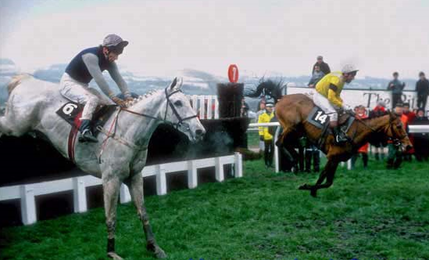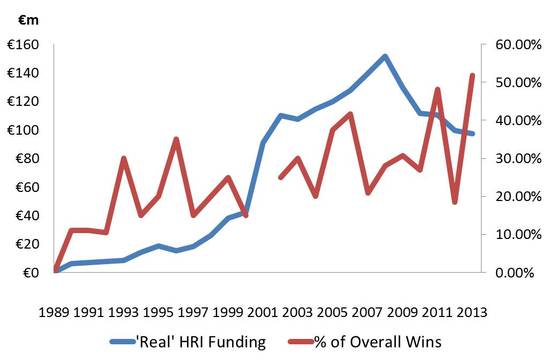 Desert Orchard and Yahoo at the last fence in the 1989 Cheltenham Gold Cup
Desert Orchard and Yahoo at the last fence in the 1989 Cheltenham Gold Cup In 1989 the much loved Desert Orchard trudged up the Cheltenham hill, narrowly defeating the John Edwards’ trained 25 to 1 shot Yahoo to win the Cheltenham Gold Cup.
Despite having won two King George VI Chases at Kempton in 1986 and 1988, doubts surrounded the great grey prior to the premier British jumps race. Questions marks were raised over ‘Dessie's’ ability to stay the gruelling three plus miles at Prestbury Park and, quite strangely, his ability to handle left-handed tracks! However, he was not to be denied and nearly 60,000 spectators watched Desert Orchard out-battle Yahoo up the Cheltenham hill. Jockey Simon Sherwood said after the race "I've never known a horse so brave. He hated every step of the way in the ground and dug as deep as he could possibly go".
The story of Desert Orchard is among the most popular of any racing story, with the year 1989 emblazoned in Cheltenham folklore.
But 1989 is also important for another reason. It was the last year there was no Irish trained winner at the March Cheltenham Festival. Since then the Irish have gone from strength to strength, breaking into double figures on three occasions; 2006 (10 winners), 2011 (13 winners) and 2013 (14 winners). In fact, last year's Festival saw a record number of Irish winners, with fourteen victories from twenty-seven races meaning Ireland won more than 50% of all races, beating the number of British trained winners for the first time.
The rise since 1989 has been nothing short of remarkable and can be attributed to the increased amount of exchequer funding directed to the Irish horse racing industry. The graph below plots the annual level of investment given to Horse Racing Ireland (inflation adjusted) and the percentage of Irish trained winners at the March Cheltenham Festival.
Since 2008 the level of direct funding to the horse racing industry has declined year on year in both nominal and real terms. While the number of Irish winners at the Festival peaked last year despite the recent cuts in government support, it’s likely there will be a lagged negative effected.
2014 exchequer estimates have not yet been fully published but it’s predicted the industry will see a further reduction in direct state support. The implication of this could mean breaking the record of fourteen winners, set last year, may be many years away. Only time will tell.

 RSS Feed
RSS Feed